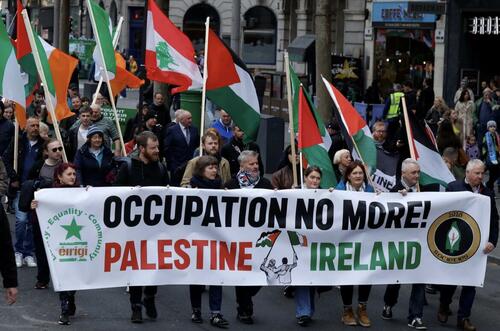
Israel is closing its embassy in Ireland in protest of what it claims are "extreme anti-Israel policies of the Irish government." While this doesn't amount to a full severing of diplomatic relations, it does represent a dramatic display of Israel's defensiveness in the face of growing international condemnation of its bloody and destructive 14-month-long war in Gaza.
“The actions and antisemitic rhetoric used by Ireland against Israel are rooted in the delegitimization and demonization of the Jewish state, along with double standards," said Israeli foreign minister Gideon Saar.

Last week, Ireland announced that it would file an "intervention" supporting South Africa's request for the International Court of Justice (ICJ) to declare that Israel has violated the Genocide Convention -- through the manner in which it's waged war on Gaza following the Oct. 7, 2023 Hamas attack on southern Israel.
In that intervention, Ireland is asking the ICJ to "broaden its interpretation of what constitutes the commission of genocide...We are concerned that a very narrow interpretation of what constitutes genocide leads to a culture of impunity in which the protection of civilians is minimized," said the Irish government in a statement.
The Palestinian death toll in Gaza is now approaching 45,000, per health authorities in the territory. Aside from Israeli military action, Palestinians are also menaced by malnourishment and disease as Israel thwarts the flow of food and supplies into the strip. Meanwhile, using satellite analysis, the UN in August estimated that nearly two-thirds of all buildings in Gaza have been damaged or destroyed -- with the toll on housing unlike anything the world has seen since World War II.
Is This Ethnic Cleansing or "Self Defense"?
— Ryan Rozbiani (@RyanRozbiani) December 9, 2024
Footage of the Israeli Army Demolishing a Residential Block in Northern Gaza is brutal to watch pic.twitter.com/rvbB7cfBPE
Simon Harris, who is Ireland's taoiseach -- a position equivalent to prime minister -- took to X to express his dismay over Israel's move:
“This is a deeply regrettable decision from the Netanyahu government. I utterly reject the assertion that Ireland is anti-Israel. Ireland is pro-peace, pro-human rights and pro-international law. Ireland wants a two-state solution and for Israel and Palestine to live in peace and security. Ireland will always speak up for human rights and international law. Nothing will distract from that.”
Last month, Harris said Ireland was ready and willing to arrest Israeli Prime Minister Benjamin Netanyahu if he were to come to the country -- in accordance with a warrant issued by the International Criminal Court. The court declared that Netanyahu and former defense minister Yoav Gallant had been credibly accused of "intentionally and knowingly depriv[ing] the civilian population in Gaza of objects indispensable to their survival..." and "intentionally directing an attack against the civilian population."
The Israeli closure of the embassy in Dublin is among the first major diplomatic moves since the conservative Saar was appointed foreign minister last month. “Ireland has crossed every red line in its relations with Israel,” said Saar. “Israel will invest its resources in advancing bilateral relations with countries worldwide according to priorities that also take into account the attitudes and actions of these states toward Israel.”
Jabalia in Northern Gaza
— Khalissee (@Kahlissee) December 8, 2024
They claim they were 'looking for hostages.' pic.twitter.com/P4abZm2PGx
The embassy closure is just the latest deterioration of Israeli-Irish relations: In May, Israel recalled its ambassadors to Ireland, Spain and Norway to retaliate for those countries' recognition of Palestine as an independent state. Despite the closure of the embassy in Dublin, Israel will still maintain diplomatic relations with Ireland, and the Irish embassy in Tel Aviv will remain open.
In his interview with Time magazine last week, President-Elect Donald Trump said "[Netanyahu] knows I want [the war in Gaza] to end." Asked if he trusted Netanyahu, Trump replied, "I don't trust anyone."
Israel is closing its embassy in Ireland in protest of what it claims are “extreme anti-Israel policies of the Irish government.” While this doesn’t amount to a full severing of diplomatic relations, it does represent a dramatic display of Israel’s defensiveness in the face of growing international condemnation of its bloody and destructive 14-month-long war in Gaza.
“The actions and antisemitic rhetoric used by Ireland against Israel are rooted in the delegitimization and demonization of the Jewish state, along with double standards,” said Israeli foreign minister Gideon Saar.

Last week, Ireland announced that it would file an “intervention” supporting South Africa’s request for the International Court of Justice (ICJ) to declare that Israel has violated the Genocide Convention — through the manner in which it’s waged war on Gaza following the Oct. 7, 2023 Hamas attack on southern Israel.
In that intervention, Ireland is asking the ICJ to “broaden its interpretation of what constitutes the commission of genocide…We are concerned that a very narrow interpretation of what constitutes genocide leads to a culture of impunity in which the protection of civilians is minimized,” said the Irish government in a statement.
The Palestinian death toll in Gaza is now approaching 45,000, per health authorities in the territory. Aside from Israeli military action, Palestinians are also menaced by malnourishment and disease as Israel thwarts the flow of food and supplies into the strip. Meanwhile, using satellite analysis, the UN in August estimated that nearly two-thirds of all buildings in Gaza have been damaged or destroyed — with the toll on housing unlike anything the world has seen since World War II.
Is This Ethnic Cleansing or “Self Defense”?
Footage of the Israeli Army Demolishing a Residential Block in Northern Gaza is brutal to watch pic.twitter.com/rvbB7cfBPE
— Ryan Rozbiani (@RyanRozbiani) December 9, 2024
Simon Harris, who is Ireland’s taoiseach — a position equivalent to prime minister — took to X to express his dismay over Israel’s move:
“This is a deeply regrettable decision from the Netanyahu government. I utterly reject the assertion that Ireland is anti-Israel. Ireland is pro-peace, pro-human rights and pro-international law. Ireland wants a two-state solution and for Israel and Palestine to live in peace and security. Ireland will always speak up for human rights and international law. Nothing will distract from that.”
Last month, Harris said Ireland was ready and willing to arrest Israeli Prime Minister Benjamin Netanyahu if he were to come to the country — in accordance with a warrant issued by the International Criminal Court. The court declared that Netanyahu and former defense minister Yoav Gallant had been credibly accused of “intentionally and knowingly depriv[ing] the civilian population in Gaza of objects indispensable to their survival…” and “intentionally directing an attack against the civilian population.”
The Israeli closure of the embassy in Dublin is among the first major diplomatic moves since the conservative Saar was appointed foreign minister last month. “Ireland has crossed every red line in its relations with Israel,” said Saar. “Israel will invest its resources in advancing bilateral relations with countries worldwide according to priorities that also take into account the attitudes and actions of these states toward Israel.”
Jabalia in Northern Gaza
They claim they were ‘looking for hostages.’ pic.twitter.com/P4abZm2PGx
— Khalissee (@Kahlissee) December 8, 2024
The embassy closure is just the latest deterioration of Israeli-Irish relations: In May, Israel recalled its ambassadors to Ireland, Spain and Norway to retaliate for those countries’ recognition of Palestine as an independent state. Despite the closure of the embassy in Dublin, Israel will still maintain diplomatic relations with Ireland, and the Irish embassy in Tel Aviv will remain open.
In his interview with Time magazine last week, President-Elect Donald Trump said “[Netanyahu] knows I want [the war in Gaza] to end.” Asked if he trusted Netanyahu, Trump replied, “I don’t trust anyone.”
Loading…




